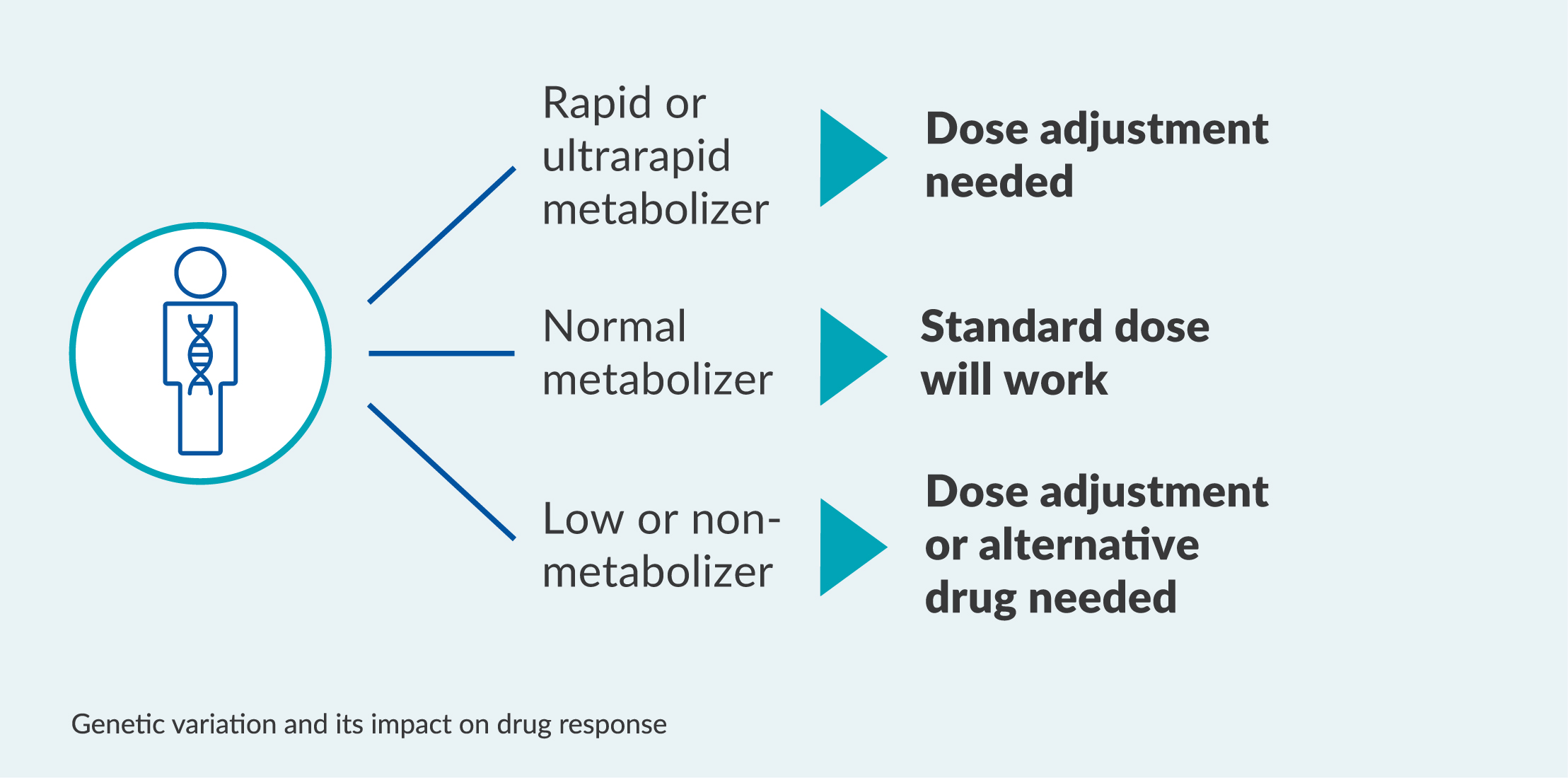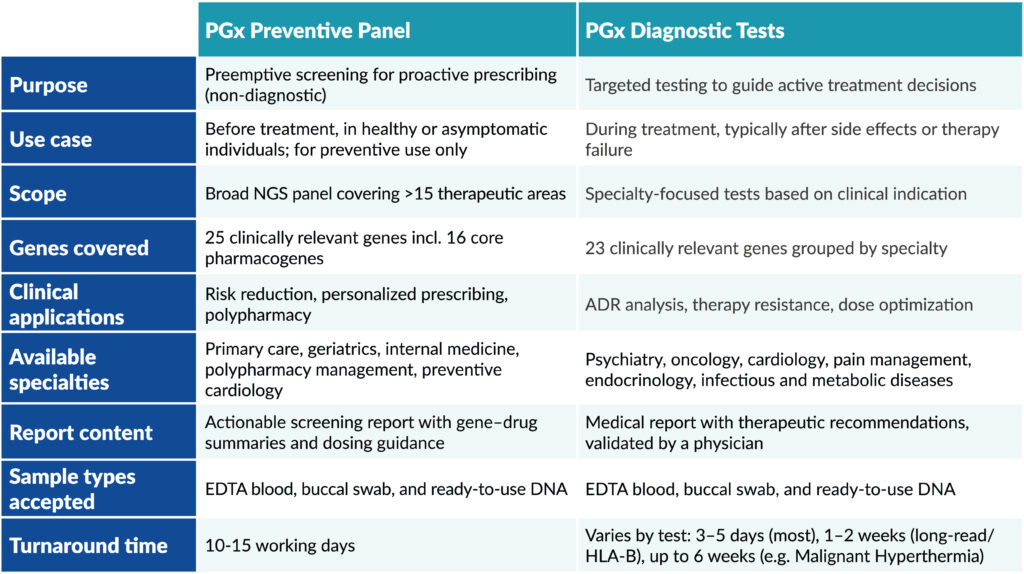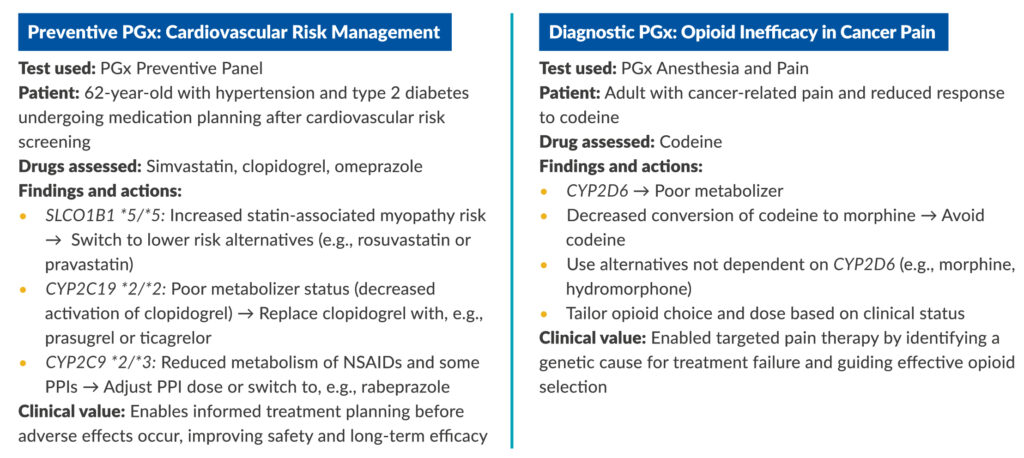ABOUT PHARMACOGENOMICS
Pharmacogenomics (PGx) examines how a person’s genetic makeup influences their response to medication. Variants in drug-related genes can influence how drugs are absorbed, metabolized, and cleared, which impacts both safety and efficacy. Futhermore, research shows that up to 50% of adverse drug reactions (ADRs) may have a genetic cause1.
Since everyone is genetically unique, prescriptions should reflect this individuality and PGx testing helps identify which drugs are likely to be more effective and better tolerated based on an individual’s genetic profile.

OVERVIEW OF THE TEST
PGx testing can be used preventively, to guide safer and more effective prescribing before treatment begins, or diagnostically, to optimize medications when patients experience side effects, poor efficacy, or treatment failure.
Our tests focus on clinically relevant genes supported by CPIC3, DPWG4, and FDA5 guidelines.
PGx PREVENTIVE PANEL
A broad, preemptive screening test.
Analyzes 25 clinical relevance genes across multiple therapeutic areas to support safer, more personalized prescribing before treatment begins.
PGx DIAGNOSTIC TESTING
Targeted tests to support therapy decisions in patients already undergoing treatment.
Includes gene panels and single-gene analyses tailored to relevant clinical specialties such as psychiatry, oncology, cardiology, and pain management.

WHY RECOMMEND TESTING?
Genetic differences account for up to 95% of the variability in how individuals respond to medications2, impacting drug metabolism, transport, and clearance. Today, more than 100 FDA5-approved medications include PGx guidance in their labels3, underscoring the growing role of genetics in prescribing.
PGx testing identifies genetic variants that influence drug response, enabling more precise, safer, and more effective treatment decisions, whether used proactively before treatment begins or in response to treatment failure or side effects.
Research shows1,2 :
● Up to 50% of adverse drug reactions (ADRs) may be linked to genetic factors
● Genetic variation explains up to 95% of differences in drug response, and most people carry at least one relevant variant
PGx testing can:
● Reduce ADRs and avoid ineffective prescriptions
● Improve drug efficacy and patient outcomes
● Personalize treatment with the right drug and dose
● Explain unexplained side effects or therapy resistance
● Support long-term medication planning and cost-efficiency
Our PGx portfolio supports prevention and treatment across the patient journey.

Choose the right test based on the clinical context and treatment stage.


HOW CAN YOU GET TESTED?
For customer service inquiries, please contact us at: info.genetics@medicover.com
1Chenchula et al. 2024, PMID: 38490995; 2Principi et al. 2023, PMID: 38004461; 3Clinical Pharmacogenetics Implementation Consortium (CPIC®); 4Dutch Pharmacogenetics Working Group (DPWG);
5Food and Drug Administration (FDA), 6Lee et al., 2022, PMID: 35034351; 7Lima et al., 2021, PMID: 32770672, 8Ramsey et al., 2014, PMID: 24918167; 9Smith et al. 2023, PMID: 36718020















